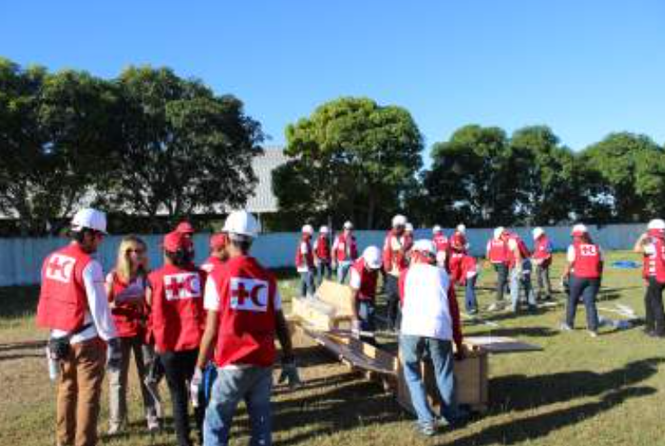
Building upon the ‘learning by doing’ training model applied in, a team of 110 field members from 35 National Societies of the Americas participated for 17 days in the 2013 Americas Field School (AFS) to respond to a humanitarian crisis in a remote area of Dominican Republic frontier with Haiti.
The field members were divided in Regional Intervention Teams (RIT) and Regional Disaster Response Units (RRU) teams and looked into several issues including health in emergencies, psychosocial support, food and nutrition, water and sanitation, Open Data Kit (ODK) assessment, techniques, Mega V Relief distribution, cash transfers, shelter in emergencies and beneficiary communication.
The AFS counted with 3 IDRL Delegates and 1 Facilitator, who faced two Disaster-Law connected situations during the relief operation. On the first day of the AFS all the participants and facilitators were detained by the Dominican army at Pedro Santana’s check point. The army claimed that they had not been informed about the arrival of a large group of foreigners and consequently had to check all the passports and speak with their line of command. The IDRL Delegates negotiated with the army the release of the participants, arguing that the IFRC signed a Legal Status Agreement with Dominican Republic and that the government should facilitate the access of humanitarian organizations when responding to disaster.
At a later stage, four IFRC trucks coming from Haiti to Pedro Santana containing essential humanitarian goods were detained at customs. The IDRL delegates facilitated the customs clearance of the cargo, by reviewing the paperwork that the IFRC had presented in customs and providing to the Dominican customs officers the paperwork that was missing.
A general briefing on the legal deployment was provided to all the AFS participants. The briefing highlighted the issues that the deployed legal officer/disaster law delegate would have to face, taking into account the differences between legal operational issues (addressing the day to day legal challenges and risks of the IFRC operation) and disaster law issues (looking at supporting the government in counting with the necessary legal instruments to respond to effectively respond to the disaster). Participants expressed interest about the legal risks of an emergency operation and about the IFRC capacity to secure access through its outreach to government.
The AFS was a good opportunity for the Disaster Law Programme to further explore the need and concept of the legal deployment. The DLP learnt about the legal issues and challenges that an emergency operation could be facing when accessing the victims and running relief programs in the field.